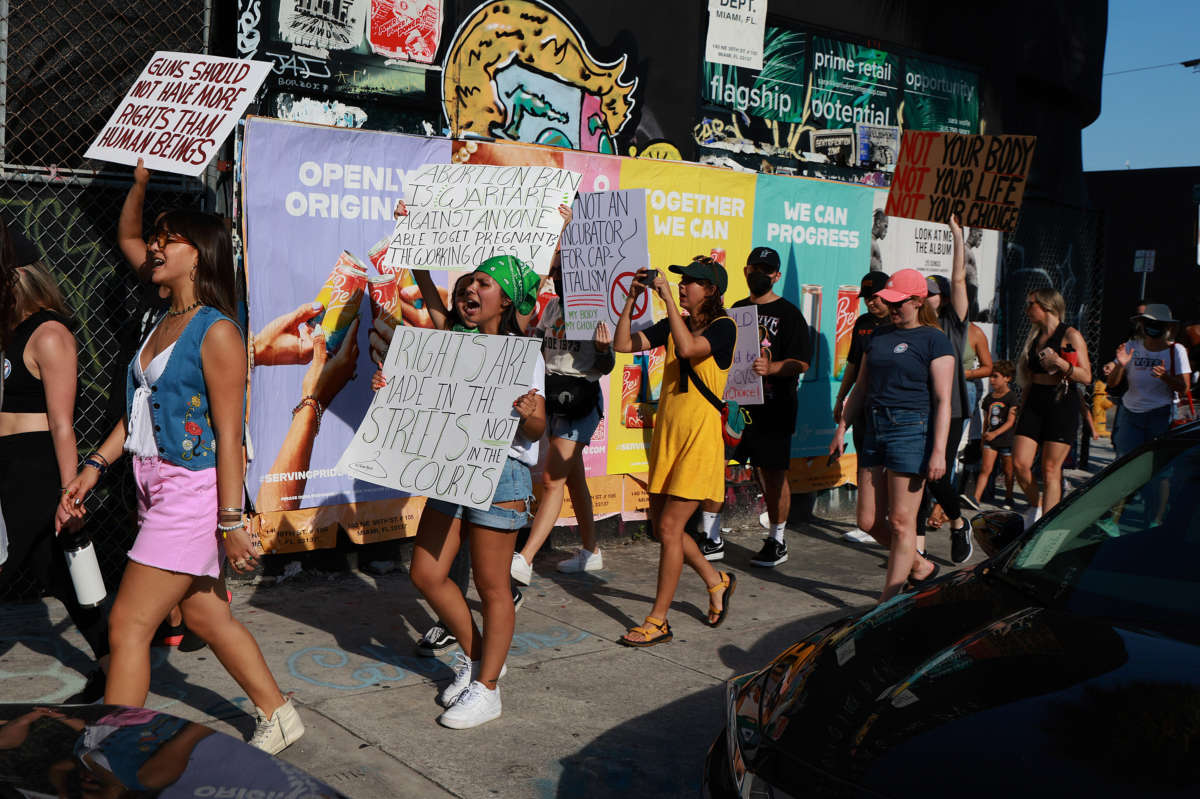Did you know that Truthout is a nonprofit and independently funded by readers like you? If you value what we do, please support our work with a donation.
A state judge in Florida has temporarily blocked a 15-week abortion ban that was set to begin this week but the injunction will likely not go into effect until after the July 4 holiday weekend.
Though the decision will be appealed and more than likely lifted in the future, abortion rights leaders are heralding the move as granting persons in Florida currently seeking abortions a little more time before the highly restrictive ban takes effect.
State circuit court Judge John C. Cooper ruled on Thursday that the law unduly violates the state Constitution’s provision on privacy rights – a constitutional amendment on a ballot measure that voters passed in 1980, and which has been used to block abortion bans and restrictive laws the state has tried to enact since then.
That constitutional provision states, in part, that “every natural person has the right to be let alone and free from governmental intrusion into the person’s private life.” Cooper, in announcing his ruling, said that he found the 15-week statute “unconstitutional, in that it violates the privacy provision in the Florida constitution, and does not meet the standards” of previous Supreme Court cases relating to abortion.
Prior to the enactment of the 15-week statute, Florida allowed for access to abortion services up to the 24th week of pregnancy.
To take effect, Cooper must sign a formal injunction and submit the paperwork today or over the weekend. Because of the Fourth of July holiday, the injunction won’t actually go into effect until sometime next week, allowing the new law to be enforced for a few days before officially being blocked, at least for the time being.
The state announced that it plans to appeal the ruling on the law, which was signed in April by Gov. Ron DeSantis (R-Florida) following the Republican-led legislature’s passage of the statute.
The law restricts all abortions after a person reaches the 15-week mark of their pregnancy. Exceptions are made for the health of the pregnant individual, but no exceptions are granted for victims of rape, incest or human trafficking.
The lawsuit seeking to overturn the law was brought forward jointly by multiple abortion rights organizations, including Planned Parenthood, the Center for Reproductive Rights and the American Civil Liberties Union (ACLU).
In a statement made after the lawsuit was filed last month, ACLU of Florida legal director Daniel Tilley said the statute “ignores the real life circumstances of people who need an abortion and deliberately puts them in harm’s way.” Florida Planned Parenthood Action also released a statement following Cooper’s announced injunction, recognizing that an appeal was imminent.
“This is not the end — we likely have a long fight ahead of us,” the organization said.
“In the wake of a cataclysmic Supreme Court ruling overturning Roe v. Wade, it is more critical than ever to protect abortion access in Florida… We will continue to stand by Floridians to protect their health and lives,” said Caroline Sacerdote, staff attorney for the Center for Reproductive Rights.
Abortion rights proponents lauded the ruling while noting that it was likely temporary and faced steep odds of being upheld, given the conservative makeup of the state Supreme Court. But at least for now, the ruling will allow a person to get an abortion after the 15-week deadline.
“Will it be appealed? Absolutely. And it may even be overturned,” said Boston-based progressive commentator Jesse Mermell. “But tell that to the person in FL who needs #abortion care right now. They’ve just been helped. And that’s worth it.”
“There are approximately 70 facilities that provide abortions in Florida,” said Tracy Weitz, a visiting scholar at the University of California, San Francisco, who specializes in reproductive health and abortion. “With the injunction set to be ordered, those clinics can “continue to meet patient needs.”
“This is a good thing,” Weitz added.
Media that fights fascism
Truthout is funded almost entirely by readers — that’s why we can speak truth to power and cut against the mainstream narrative. But independent journalists at Truthout face mounting political repression under Trump.
We rely on your support to survive McCarthyist censorship. Please make a tax-deductible one-time or monthly donation.
